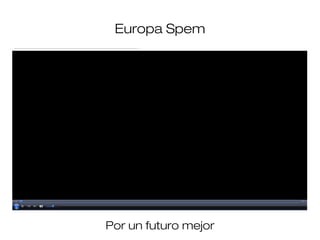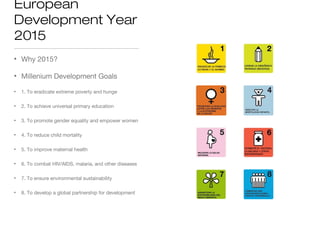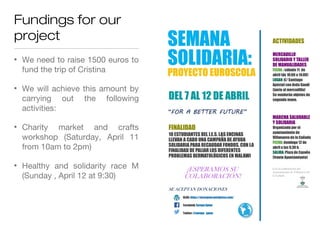Eusp en ingles
- 1. Europa Spem For a better future
- 2. Malawi • Located in the southeast of Africa • Lake Malawi (29600m³) is one of its most essential features and covers 20% of the country ´s surface
- 3. Brief explanation of the history of Malawi • The natives are called the Chewa • In the XIX century, it happened to be a protectorate of Britain and got its independence in 1964 • It is divided in three regions (north central and south)
- 4. Benga • Benga is the place where we are developing our project. • There is where you find the development of the project of the catholic parish of Benga.
- 5. Why Malawi? • It is one of the least developed countries in the world. (position of 160 out of 162) according to UNICEF 2010 • 40% of its population is below poverty rate • Main economic activity is subsistance agriculture • Health system is of poor quality, with one doctor for every 65.000 people. • It is the number one country in AIDS, which attacks the inmune system and worsens skin problems.
- 6. Current situation in Malawi • Large distances and lack of communication same president • Good quality of fresh water but they lack the technology to supply it • During the time of heavy rain, there are serious floods, like the one produced in January 2015.
- 7. Skin problems in Malawi • We don´t know exactly what illneses the volunteer doctors are going to find. • According to their lifestyle and other general issues, they can estimate a serious if illnesses thay may be able to treat. • Moreover, AIDS worsens these problems • The lack of hygiene practices makes evrything more dangerous for the population
- 8. Our project • We are a group of 10 students from the IES Las Encinas • The town hall put us in contact with a neighbour who wanted to volunteer in Malawi • The projects focuses on skin problems and other venereal illnesses in Malawi.
- 9. Euroscola “A life of dignity for everyone: end poverty and give the world a sustainable future”
- 10. Europa Spem Por un futuro mejor
- 11. European Development Year 2015 • Why 2015? • Millenium Development Goals • 1. To eradicate extreme poverty and hunge • 2. To achieve universal primary education • 3. To promote gender equality and empower women • 4. To reduce child mortality • 5. To improve maternal health • 6. To combat HIV/AIDS, malaria, and other diseases • 7. To ensure environmental sustainability • 8. To develop a global partnership for development
- 12. How is the politics of development and the cooperation of the EU? • The EU is one of the most important solidarity projects in the world • It extends to other countries its value and principles based on the defense of human rights, environment and the state of law.
- 13. What does the EU in Malawi? 2014 Electoral Observation Mission .
- 14. Other colaboration projects of the EU in Malawi • Malawi Peri-Urban Water & Sanitation – Important project carried out by the European Investment Bank, that focused on improving water and other sanitary services in perifery areas of the main urban centres.
- 15. • The EU also collaborates with other local and international organizations with wide experience with solidarity projects. One such organization is a NGO developing a project which aims at saving energy and promoting sustainable practices in everyday tasks. Other colaboration projects of the EU in Malawi
- 16. Raising the money for the project • We need to raise 1500 euros the expenses of the trip of Cristina • We will achieve this amount by carrying out the following activities: • Charity market and crafts workshop (Saturday, April 11 from 10am to 2pm) • Healthy and solidarity race (Sunday , April 12 at 9:30)
Editor's Notes
- Does anyone have any idea where Malawi is? Its in the southeast of the African continenent but its not coastal. In this map you can see it, Also you can check that a large part of the country is made up of a lake. In fact, 20% of the surface of the country is made up of water. This lake and its 29600 m3 are essential for the population of Malawi
- The natives are called the chewa who arrived from the rainforests of Congo. In the XIX century, it happened to be part of the central part of Africa protected by Britain. It got its independence in 1964 and since then had 4 presidents and has been divided into 3 regions north, central and south that are divided into 28 districts.
- Benga is the place where we are developing our project. Its in the district of Nkhotakota and its main activities are fishing and farming. There is where is the development of the project of the catholic parish of Benga. You are probably asking why you have to see a parish like that. The local parish translated the project so it is necessary.
- We chose Malawi because it is one of the least developed countries in the world. In fact it is the second least developed country according to data from unicef in 2010 of accounts of their GDP. 40 per cent of their population is below the poverty rate, this means they don´t have basic things or access to them. The rent per capita is 333 dollars per year. The main economic activity is subsistence agricultural. In fact. 90 % of the population works in agriculture. The wages are very poor and they work long hours with old tools. There health system is poor quality, with one doctor for every 65000 people. The number one problem is aids which attacks the immune system and skin problems.
- Recently the country has problems with the lack of communication that has caused the same president to be chosen for many years over. This lack of communication is because of the distances between small villages or hamlets, if you can call them that. Hardly anyone owns a car so the distances are enormous. There is a good quality of water but they don´t have available the necessary technology to supply it, so the people suffer. On the opposite side, the time of heavy rain produces serious floods. Remember that we are talking about a basic agricultural country at the mercy of the weather conditions. Many people suffer hunger, despite their problems the people sing and dance and try to celebrate life.
- The project that we are trying to help is to improve dermatological services while helping primary schools and the local population in the Benga área. The benefits alongside medical intervention are educating people about hygiene practices that can prevent people from developing illness in the future.We don´t know exactly what illnesses the volunteer doctors are going to find when they go to Malawi but, according to the style of living there and the general issues, we can estimate a series of illnesses that we can treat. Within these, there are the “tiña” which is a fungas, “scabies” caused by a parasite and “black larva” where if you have injuries to the toes you have larva growing between them and it affects the light of the eyes.
- We are a group of ten students and as you can see we are from IES Las Encinas. We decided to take part in this big project called Euroscola which focuses on development. The town mayor helped us to start by putting us in contact with Cristina Galvan, a neighbour who wants to help in Malawi. She is going to help solve skin problems . The problem is nothing is free and we need to raise 1500 for all the expenses and this is where we fit in, we are holding a series of activities to raise this money so that the world can be a little fairer.
- Euroscola is an Incredible project of a European level that tries to achieve equality with their motto " A life of dignity for everyone: end poverty and give the world a sustanable future" To achieve this they organise a competition in which you have to present a project on solidarity. What we have already given a presentation on, we will be evaluated on.
- Why 2015? To respond to this question we have to go back to the year 2000. In 2000, the countries who were members of the United Nations met in New York to discuss what were the main problems that affected the poorest countries and they decided to develop a series of concrete objectives to reduce or eliminate where possible, the most serious problems. This meant the birth of the Millenium Development Goals .There are 8: To eradicate extreme poverty and hunger To achieve universal primary education To promote gender equality and empower women To reduce child mortality To improve maternal health To combat HIV/AIDS, malaria, and other diseases To ensure environmental sustainability To develop a global partnership for development In fact, if you pay attention, our project has a lot to do with these objectives, for example, with number 4 reducing mortality of children under 5, with number 5, bettering mothers health and mainly with number 6, combating aids, malaria and other diseases. The EU is one of the most active agents in the promotion of achieving the Milininuem Goals and they are committed to truly helping financially projects focused on cooperation and humanitarian aid. 2015 is the year that serves to allow us to reflect on the value on what has been achieved and how much we still need to do. The EU year of development 2015, therefore, should be a matter for public opinion. We all want to say that the political focus on development in the Union informs us about the necessity of contributing to the development of the poorest countries because their growth will affect also our growth. The theme of the Euroscola competition of this year deals with development which is a solidarity initiative.
- In the first place we present an important data. The EU is one of the most important solidarity projects that has been created. Look, for example, at our country, Spain. Thanks to our integration in the EU, we have already seen and continue to see how our lives are better, politically, from an economic point of view, socially and culturally. The currency of the Euro, commercial exchanges between all of the member countries, Educational exchange programmes, … these are only a small sample of how the EU has contributed to the growth of a world of peace and prosperity in Europe.These are the same principles that the EU wants to extend to other countries. Thanks to different commercial measures and the signed cooperation of third world countries, the EU extends their value and influence further than the EU borders. The defense of the human rights, the environment and the democracy and the right of the state are part of our historical and cultural baggage.
- The European External Action is a diplomatic service relatively new for the Union. It was created in 2011, with firm roots from the Lisbon Treaty. This type of action recognizes the importance of development outside of the EU that if it could be common, more efficient and coherent, and could be a major influence of the EU in the world. To achieve this, the EU has the help of 139 delegations representing different countries of the world. The EU delegation in Malawi was founded In the capital, Lilongwe. The EU in Malawi participates in programmes that result in better living conditions for the inhabitants. The sectors that they centre their plans on for the period 2014-2020 are: 1 good government, which means to implement a democratic system where the rights of the state are implemented and which respect human rights of the groups most vulnerable2 agriculturaL sustanability, with the introduction of practices that are more respectful with the environment 3 promotion of profesional and secondary Education, in Malawi you can find a lot of work that has not got the basis that can formulate and add to the economy of the country. In light of this collaboration, we can highlight the measures implemented by the EU in 2014, when the EU implemented the Electoral Observation Mission, for the three types of elections, presidental, local and parlimentary throughout the country. The observers of different member states did a segment of all of the electoral process to ensure that the election practices in Malawi would conform to the same election norms in other countries and would follow constitucional laws.
- We can highlight other programmes for example, the programme carried out by the European Investment Bank that focused on improving access to clean water and other sanitary services in áreas on the perifery and far away from urban facilites.
- The EU has collaborated in helping local and international organization with a lot of experience with solidarity projects. One such project is an NGO project that aims at saving energy. In general, the families in Malawi cook how it appears in the first photo, placing three stones and burning wood. The energy costs are huge and also the women have to go many times to search for wood far away from their homes. This project thought about how to make a mud stove very economical that is going to be used for cooking and can save a considerable amount of energy and cut down significantly on the carbon emissions in the atmosphere. Apart from these advantages, the goal is to reduce the number of accidents caused by burns, specially to children playing around the fire.
- We have tried to explain with this PPT the context in which our project will be carried out. We have organized a series of activities in order to make people realize about the needs of Malawi and awake in them the need for donating money. We hope this information has been useful and, above all, we wish it has moved you closer to the reality of what is going on in this country. Please think over the fact that the EU is collaborating in projects very similar to this one that contribute to improve the lives of thousands of millions of people. Together we can make our world a better, fairer and more sustainable place. Thank you very much for listening.
















